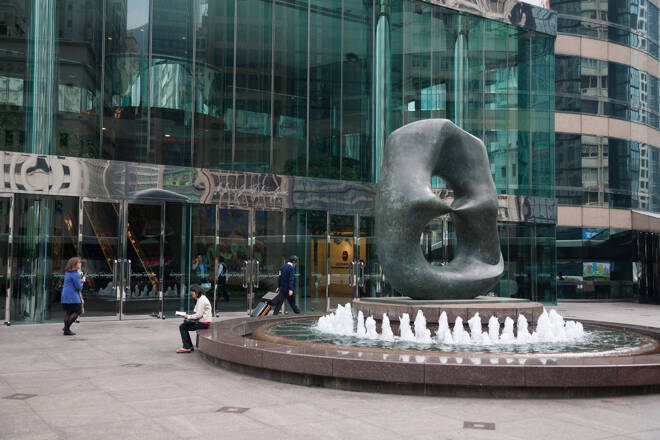Advertisement
Advertisement
Hang Seng Index, ASX 200, Nikkei 225: PBoC Spotlight: Expectations for LPRs and Real Estate Support
By:
PBoC's Role in Asian Markets: Loan Prime Rate Forecast and Real Estate Support. Beyond China, corporate earnings remain a focal point.
Highlights
- The Nikkei made gains on Friday, while the Hang Seng and ASX 200 ended the session in negative territory.
- Alibaba earnings sent the Hang Seng Index into the red, with updates on US-China talks disappointing the broader market.
- On Monday, the PBoC will be in the spotlight as Beijing pledges to support the property sector.
Overview of the Friday Session
On Friday, the Nikkei ended the session in positive territory, while the Hang Seng Index and the ASX 200 ended the session with losses. Alibaba left the Hang Seng Index in the red. Disappointing updates from talks between US President Joe Biden and Xi Jinping weighed on market risk sentiment.
Overnight US economic data from Thursday offered early support. A larger-than-expected rise in US jobless claims and weaker-than-expected industrial production supported a more dovish Fed rate path. The disappointing numbers coincided with dovish comments from FOMC voting member Lisa Cook. Cook warned there was no guarantee of a soft landing.
On Thursday, the Nasdaq Composite Index and S&P 500 rose by 0.07% and 0.12%. The Dow fell by 0.13%.
The US session set the tone for the Friday Asian session. There were no Asian economic indicators for investors to consider. However, corporate earnings and updates from Biden and Jinping talks impacted the Hang Seng and ASX 200.
PBoC in the Spotlight
A positive end to the week for the US equity markets could provide early direction to the Asian equity markets. The S&P 500 gained 0.13%, with the Dow and Nasdaq Composite Index rising by 0.01% and 0.08%.
However, chatter from Beijing and the PBoC will be in the spotlight. The PBoC will set the 1-Year and 5-Year Loan Prime Rates. Economists expect the PBoC to leave the LPRs unchanged at 3.45% and 4.20%, respectively.
With investors fretting about the Chinese real estate sector, assurances to support the property sector may offer comfort. On Friday, China’s central bank and regulators reportedly pledged to support the real estate sector. However, investors may need more than words.
While China will be a focal point, corporate earnings warrant consideration.
In the futures markets on Monday, the ASX 200 was up 28 points, while the Nikkei was down 80 points.
ASX 200
The ASX 200 declined by 0.13% on Friday. Tech stocks were a drag on the ASX 200, with the S&P/ASX 200 All Technology Index (XTX) falling 0.36%. Energy and bank stocks also contributed to the session loss, while mining stocks cushioned the downside.
Bank stocks had a mixed Friday session. ANZ Group Holdings Ltd (ANZ) and Westpac Banking Corp. (WBC) ended the day down 0.50% and 0.24%. National Australia Bank Ltd. (NAB) slipped by 0.07%, while the Commonwealth Bank of Australia (CBA) gained 0.18%.
Oil stocks ended the session in negative territory. Woodside Energy Group Ltd (WDS) and Santos Ltd (STO) saw losses of 2.27% and 0.99%, respectively.
However, mining and gold stocks limited the losses. BHP Group Ltd (BHP) and Rio Tinto Ltd. (RIO) saw gains of 0.11% and 0.36%. Fortescue Metals Group Ltd. (FMG) ended the day up 0.08%.
Gold stocks Evolution Mining Ltd. (EVN) and Northern Star Resources Ltd. (NST) ended the session with gains of 4.17% and 3.89%.
Hang Seng Index
The Hang Seng Index ended the Friday session down 2.12%. Alibaba (9988) left the Index in negative territory. Investors responded to news about the cloud group spin-off.
Alibaba (9988) tumbled by 9.96%, with Tencent (0700) falling 2.96%.
Bank stocks contributed to the session losses. HSCB (0005) declined by 0.59%. China Construction Bank (0939) and Industrial and Commercial Bank (1398) ended the day down 1.31% and 1.83%, respectively.
The Nikkei 225
(Graph for reference purposes only)
The Nikkei gained 0.48% on Friday. Corporate news, sentiment toward corporate earnings, and a steady USD/JPY supported buyer demand.
Sumitomo Mitsui Financial Group (8316) rose by 1.39%, while Mitsubishi UFJ Financial Group (8306) ended the session flat.
Tokyo Electron (8035) and KIDDI Corp. (9433) ended the session up 0.10% and 1.88%, respectively.
However, Sony Corp (6758) fell by 0.91%, with Softbank (9984) and Fast Retailing (9983) seeing losses of 0.64% and 0.41%.
For upcoming economic events, check out our economic calendar.
About the Author
Bob Masonauthor
With over 28 years of experience in the financial industry, Bob has worked with various global rating agencies and multinational banks. Currently he is covering currencies, commodities, alternative asset classes and global equities, focusing mostly on European and Asian markets.
Advertisement
